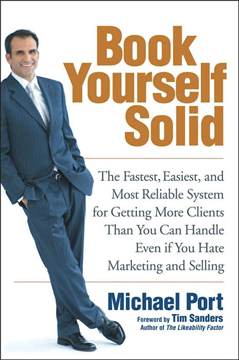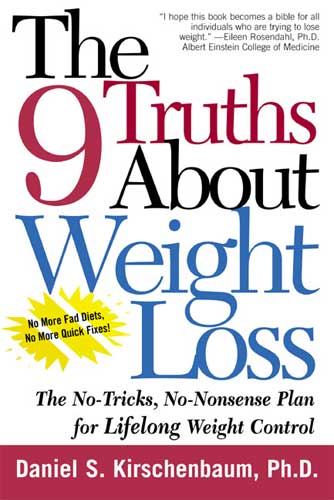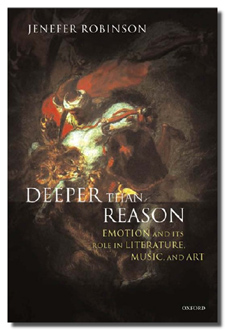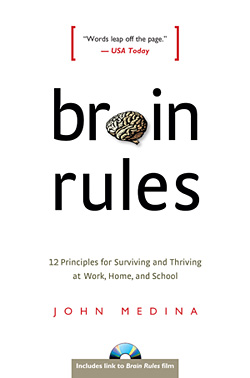 Michael Port’s bestselling marketing book for service professionals, Book Yourself Solid, doesn’t really break new ground, but it’s a profoundly useful book if you are a service professional trying to get more business and are willing and able to love what you do. The most powerful thing about the book is that it asks extremely productive, basic questions that we often don’t consider when trying to market ourselves, questions that put a high value on integrity and connection not just for their own sake, but as basic forces to find and book new clients. I learned a lot from Port.
Michael Port’s bestselling marketing book for service professionals, Book Yourself Solid, doesn’t really break new ground, but it’s a profoundly useful book if you are a service professional trying to get more business and are willing and able to love what you do. The most powerful thing about the book is that it asks extremely productive, basic questions that we often don’t consider when trying to market ourselves, questions that put a high value on integrity and connection not just for their own sake, but as basic forces to find and book new clients. I learned a lot from Port.
With that said, there are also some serious problems with Book Yourself Solid. The most obvious is that it’s relentlessly self-promoting. Port uses “Book Yourself Solid” as a brand identity that he then plasters over page after page, referring to Book Yourself Solid Certified Professionals and the Book Yourself Solid Writing Strategy and whatnot. He even refers to fairly common marketing strategies with the BYS brand. Honestly, I don’t know if this is a shortcoming of Port’s marketing understanding or if I’m just outside his target market. Actually, he speaks repeatedly and meaningfully about the importance of knowing who is and is not a good client for you, emphasizing that every service professional has personal strengths and a personal style that will be great for some clients and not a good fit for others, but for himself, he seems to throw the net very wide. He doesn’t filter his readers: he tries to convince them they’re his kind of people. Actually, maybe that does filter his readers, because perhaps the people who believe in the hard sell and money for its own sake quickly get tired of his assumptions and give up on the book.
Regardless, although I was willing to sample Port’s e-mail newsletter and so on, I quickly unsubscribed once I realized how energetically he was spamming himself, and I expect to stay away from most of his other materials, too. In my particular case, he has managed to sell one book and get me to advocate for it, but he’s probably ruined his chances of selling me anything else. Not that he needs my money!
As for me, I’m entirely behind the idea that our work should be driven by our passions and by wanting to bring some meaningful value to those we serve. I just have trouble being bombarded over and over with blatant marketing messages. I was going to say I “can’t stand” that bombardment, but the fact of the matter is that I can and did stand it in order to get all of the good information out of that book.
And there is a lot of good information, especially the broad strokes and deep questions. Port offers a way to rethink a business from the ground up that takes the stress, distastefulness, and self-centeredness out of self-promotion while bringing in new clients. In some of the details, the book isn’t as strong, though here too there’s a lot of good material. I was impressed, for example, at how on the mark the social media section was, considering how changeable that world is.
The writing section, on the other hand, has some bad gaps and even some misinformation. For instance, there’s no mention of the fact that electronic querying for magazines is very common now; the SASE method is still described, and while that still applies for some markets, it seems a bit out of date.
Considering how strongly I would recommend this book to any service professional who wants to build up business through integrity and offering great value, I seem to have a lot of complaints about it, but let me mention one more: Port’s special article of faith. He states repeatedly that he believes that if you feel called to offer your services to the world, then there are people out there who need them. I have to say that I think this is dangerous bunk. Why dangerous? Because it suggests that you need to just do what you want to do, and the market for it will magically appear. I feel strongly that creating useful and valuable things in the world is accomplished by starting with the need itself, not with what you want to supply.
Fiction writing is a great example: for instance, just because I write and love a story doesn’t mean that there’s anyone else out there who wants or needs to read that story. Just because I love to write a particular kind of fiction doesn’t mean that there’s a market for that kind of fiction. Port seems to be promising unlimited success for everyone regardless of what they want to do, and some people who dive in regardless of whether there’s anyone who needs them will be sadly disappointed, because people don’t spend their money on just anything.
If you want to follow your passion without regard to what other people are wanting and needing, that’s fine–just don’t expect anyone to pay you for it.
With that said, I don’t think Port’s creed ruins the book, because it seems to me very close to the truth, which I’d say goes something like “Work hard at what you love and pay attention to what others need, and sooner or later you’re likely to find a place where the two meet.”
Overall, Port’s book was tremendously useful to me, even when it was being mildly annoying. If you’re working on building a business, I hope you’ll give it a shot, spend some real time thinking about the questions he raises, and see if it doesn’t help take you to the next level.
A side note: A lot of photos of business gurus are laughable in terms of body language, and this book cover is no exception. Michael, get your hands out of your pockets and uncross your ankles! If you don’t know why I’d say that, check out this book.


 The 9 Truths About Weight Loss
The 9 Truths About Weight Loss

